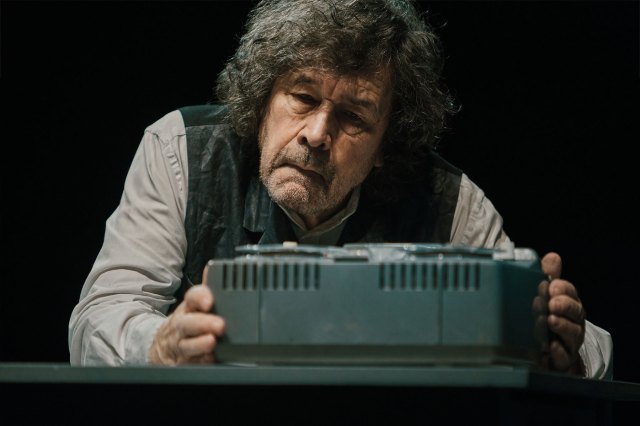Krapp’s Last Tape with Stephen Rea at Barbican Theatre – review
Vicky Featherstone’s revival runs until 3 May

Krapp is the man of the moment. Sixty-seven years after Samuel Beckett’s monologue was first performed by Patrick Magee, there are two versions on stage in the UK simultaneously. In York, the hour-long play stars Gary Oldman; in London, Stephen Rea is reprising his version, first seen at the Dublin Festival last year.
Meanwhile, Samuel West and Richard Donner are indulging in some advance planning. Given that the piece takes the form of a man’s dialogue with a taped recording of his voice 30 years earlier, they are – at the ages of 39 – taping their voices to perform the play when they reach Krapp’s age of 69.
In the meantime, Rea takes the spotlight – almost literally in Vicky Featherstone’s production, which pinions him in a pool of white light, on an abstract and uncluttered stage, designed by Jamie Vartan to look like a scene from a film noir, every edge sharply delineated. This monochrome study of isolation is surrounded by utter darkness, into which Rea flings the skins of the bananas he eagerly eats.
Twice he glances quickly over his shoulder, as if surveying the blackness to come, the end of a life that he has recorded each day on his birthday, recording its events not in J Alfred Prufrock’s coffee spoons but in diary entries that switch between banality and a poetic letting go.

Like T S Eliot’s anti-hero, Krapp is looking back on failure, on missed opportunities, on loss. There’s great sadness in Rea’s delivery. He recorded the taped lines 16 years ago; he is now 78. The sounds – amplified by Kevin Gleeson’s clever, echoing design – are subtly different. The younger man is pompous, proud, revelling in his vocabulary and his matter-of-factness. He sees himself “at the crest of the wave”.
The man sitting at this table in white, shoes like a clown’s, is palpably more ruined, his knowledge of the failure of his ‘magnus opus’ acknowledged, his loneliness accepted. Rea’s Krapp is more dapper than some: he has a fussy neatness in the way he messes with the boxes that contain the spools of his life and draws that word out with amused satisfaction.
He takes his bananas from a long, locked drawer, pulling it out with the precision of a mime artist. His movements are jerky but purposeful. There’s a bitter sharpness to his description of his encounter with “a bony old ghost of a whore”, a self-aware mocking of his own inadequacy. He holds up his idealistic younger self for terrible contempt, but he cannot stop the recorded voice filling the emptiness with a lyricism that the man on stage has shed.
The line “I shall feel it in my hand until my dying day” as he talks of the hard, shiny ball he was throwing for a dog when the blinds were pulled down as his mother died, fills the air with a terrible, haunting poetry.
And as the tape records the moment when Krapp gave up on love – and life – “I said again I thought it was hopeless and no good going on and she agreed, without opening her eyes” – he places a protective arm around the machine, every line in his face a falling map of sadness. Obsessively rewinding it to that spot, his agony is all the more painful for being contained in a performance of such restraint.















